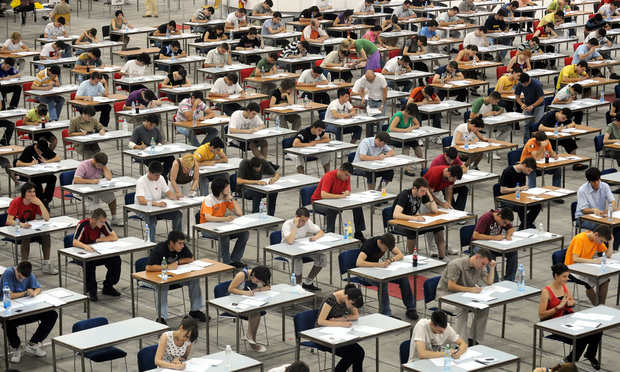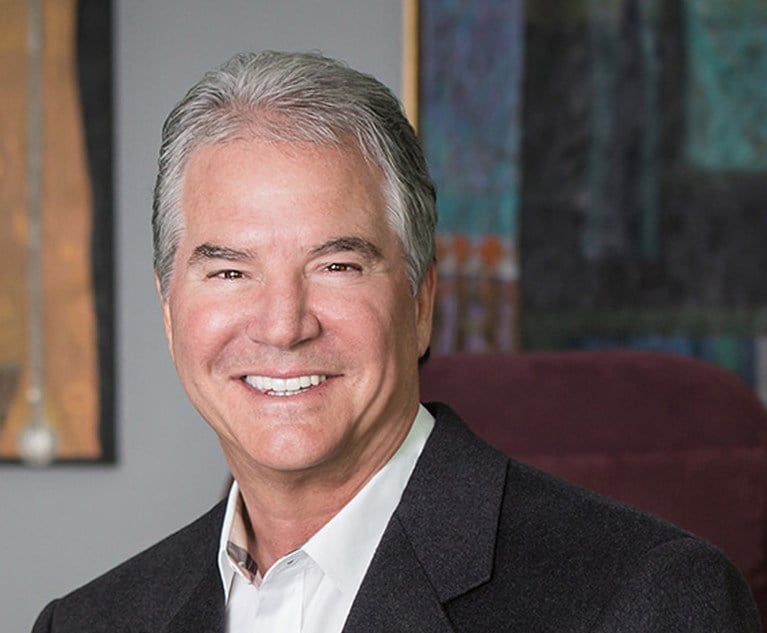LSAT-Maker Held In Contempt Over Disability Accommodations
Requests for accommodations on the Law School Admission Test have skyrocketed since the government required the exam's administrator to ease the process of gaining them, but a federal judge has ruled that the Law School Admission Council is still falling short when it comes to accommodating disabled test takers.
March 06, 2018 at 01:30 PM
7 minute read

The Law School Admission Council violated court-ordered rules meant to help disabled test takers gain accommodations on the Law School Admission Test, ruled a federal judge who held the organization in civil contempt.
Judge Joseph Spero in the U.S. District Court for the Northern District of California did not hold back, in a ruling handed down Monday, about what he saw as the council's efforts to circumvent procedures agreed to under a 2014 consent decree the test administrator reached with the U.S. Department of Justice and the California Department of Fair Employment and Housing.
“[The council] deprived certain candidates of their automatic right to accommodations previously granted on comparable tests by improperly imposing substantive conditions on the candidate's ability to accept those accommodations, and denied those candidates and others the right to the procedural safeguards established by the Panel for requests not based on such past accommodations,” Spero wrote in a 53-page opinion.
Spero also identified problems with the council's reporting and record keeping, as well as its compliance with rules concerning the plaintiffs' access to accommodation request records.
Spero ordered the consent decree, which was set to expire in May after four years, to be extended an additional two years through 2020. He also ordered that the independent monitor appointed under the decree conduct two additional audits of the council's accommodation requests records. Additionally, he awarded California fees and costs.
However, Spero denied California's request to replace independent monitor Arthur Coleman—who was jointly appointed by the parties—due to his alleged inability to identify problems with the council's compliance. (Coleman's February 2017 report concluded that the council had substantially complied with the myriad rules laid by an expert panel.)
The council said Tuesday that it's disappointed in Spero's ruling in light of Coleman's findings of compliance.
“The core of the dispute centered on how [the council] processed requests for accommodations that went over and above the supporting documentation provided by candidates. [The council] had already voluntarily adjusted its processes in response to [California's] concerns,” reads a statement issued by the council Tuesday. “Unfortunately, the court did not credit the monitor's report, [the council's] operational adjustments, or [it's] good faith interpretations of the Decree in extending the term of the Decree for two more years.”
Kevin Kish, director of the California Department of Fair Employment and Housing, said in a statement Tuesday that his department will continue to work with the council to ensure it is complying with the court order.
“When we bring violations of an agreement to light and informal attempts to resolve them fail, the Department will not hesitate to go to court to ensure the people protected by those agreements obtain the benefits we secured for them,” he said.
Ruth Colker, a professor at Ohio State University Michael E. Moritz College of Law and a member of the expert panel that revised the council's disability accommodation procedures in 2015, said she was pleased with Spero's ruling and the extension of the consent decree.
“I hope this decision causes [the council] to take seriously its obligation to accommodate testing applicants with disabilities and end its egregious practices of directly defying the clear rules contained in both the Consent Decree and Best Practices Report,” she said. “As an entity overseeing the admission of students to law school, I would hope that [the council] would conduct itself with the highest standards of ethics and integrity.”
The contempt ruling comes after years of litigation over LSAT disability accommodation requests. California first sued the council in 2012, alleging its LSAT accommodation procedures were too burdensome and violated the Americans with Disabilities Act. The Justice Department intervened in the suit, and in 2014 the parties announced a consent decree. Under that agreement, the council paid $8.7 million to 6,300 people who applied for accommodations between January 2009 and May 2014. It also agreed to change how it handled test accommodations, most notably ending the practice of alerting law schools to LSAT scores earned by people who received extra time on the exam, a practice known as flagging.
However, the parties disagreed about the details of the council's revised accommodations procedures and spent another year wrangling in court before they signed off on a series of best practices developed by an expert panel.
Compliance with those best practices is at the heart of the latest legal fight. California in November asked the court to hold the council in civil contempt for a number of alleged violations pertaining to how it assessed accommodation requests, the documentation it required from test takers, and its record keeping for requests that were denied and granted. (The Justice Department did not join California in the civil contempt request.)
Much of California's contempt motion focused on the use of what it calls the “50% email,” which it characterized as an ultimatum for LSAT takers whereby the council automatically offered test takers a lesser accommodation than requested without conducting a full review of their application. (The 50% name is a reference to the offer of half a test takers's requested accommodations.) If the test taker declined the offer, they were given a short time frame in which to provide supplemental documentation and told they risk being registered for the test without any accommodations at all. When test takers accepted the lesser accommodations, their requests were recorded as being granted in full—which was an attempt to make the council seem more generous with accommodations that it really was, California claimed.
The council argued in its opposition motion that it has since changed that process and now automatically enrolls test takers with the lesser accommodations first offered while also giving them the option to provide additional documentation to receive the additional ones.
More generally, the council said the rules laid out under the consent decree's best practices are burdensome and go far beyond the requirements of other standardized test organization. Requests for accommodations on the LSAT have more than tripled since the consent decree went into effect. It received “at least 5,372” such requests in the 2017-2018 testing cycle, according to Spero's opinion. Yet over a two-year period, the council sent just 70 such requests to outside council for review and processed just eight appeals, California alleged.
The council also offered evidence to the court that some LSAT takers are abusing the accommodations they receive. One test taker with a diagnosis of Attention Deficit Hyperactivity Disorder requested 14 different accommodations and was granted all but one.
One test taker who was granted so-called “stop the clock breaks” often given to those with medical conditions who need extra bathroom breaks, took 150 breaks over the course of the exam. Together with the extra time he received on the exam itself, it took him 16 hours to complete what is typically a three-hour exam.
“While this ruling is not the outcome we had hoped for, [the council] will continue to work steadfastly to comply with the Decree under the guidance provided in the Court's ruling,” reads the council's statement. “We remain dedicated to processes that treat all test takers fairly, and we will continue our initiatives to streamline procedures, improve our website, and provide user-friendly services to disabled candidates in all aspects of our work.”
This content has been archived. It is available through our partners, LexisNexis® and Bloomberg Law.
To view this content, please continue to their sites.
Not a Lexis Subscriber?
Subscribe Now
Not a Bloomberg Law Subscriber?
Subscribe Now
NOT FOR REPRINT
© 2025 ALM Global, LLC, All Rights Reserved. Request academic re-use from www.copyright.com. All other uses, submit a request to [email protected]. For more information visit Asset & Logo Licensing.
You Might Like
View All
Assessing the Second Trump Presidency’s Impact on College Sports


LSAT Administrator Sues to Block AI Tutor From Using ‘Famous, Distinctive’ Test Prep Materials
3 minute readTrending Stories
Who Got The Work
J. Brugh Lower of Gibbons has entered an appearance for industrial equipment supplier Devco Corporation in a pending trademark infringement lawsuit. The suit, accusing the defendant of selling knock-off Graco products, was filed Dec. 18 in New Jersey District Court by Rivkin Radler on behalf of Graco Inc. and Graco Minnesota. The case, assigned to U.S. District Judge Zahid N. Quraishi, is 3:24-cv-11294, Graco Inc. et al v. Devco Corporation.
Who Got The Work
Rebecca Maller-Stein and Kent A. Yalowitz of Arnold & Porter Kaye Scholer have entered their appearances for Hanaco Venture Capital and its executives, Lior Prosor and David Frankel, in a pending securities lawsuit. The action, filed on Dec. 24 in New York Southern District Court by Zell, Aron & Co. on behalf of Goldeneye Advisors, accuses the defendants of negligently and fraudulently managing the plaintiff's $1 million investment. The case, assigned to U.S. District Judge Vernon S. Broderick, is 1:24-cv-09918, Goldeneye Advisors, LLC v. Hanaco Venture Capital, Ltd. et al.
Who Got The Work
Attorneys from A&O Shearman has stepped in as defense counsel for Toronto-Dominion Bank and other defendants in a pending securities class action. The suit, filed Dec. 11 in New York Southern District Court by Bleichmar Fonti & Auld, accuses the defendants of concealing the bank's 'pervasive' deficiencies in regards to its compliance with the Bank Secrecy Act and the quality of its anti-money laundering controls. The case, assigned to U.S. District Judge Arun Subramanian, is 1:24-cv-09445, Gonzalez v. The Toronto-Dominion Bank et al.
Who Got The Work
Crown Castle International, a Pennsylvania company providing shared communications infrastructure, has turned to Luke D. Wolf of Gordon Rees Scully Mansukhani to fend off a pending breach-of-contract lawsuit. The court action, filed Nov. 25 in Michigan Eastern District Court by Hooper Hathaway PC on behalf of The Town Residences LLC, accuses Crown Castle of failing to transfer approximately $30,000 in utility payments from T-Mobile in breach of a roof-top lease and assignment agreement. The case, assigned to U.S. District Judge Susan K. Declercq, is 2:24-cv-13131, The Town Residences LLC v. T-Mobile US, Inc. et al.
Who Got The Work
Wilfred P. Coronato and Daniel M. Schwartz of McCarter & English have stepped in as defense counsel to Electrolux Home Products Inc. in a pending product liability lawsuit. The court action, filed Nov. 26 in New York Eastern District Court by Poulos Lopiccolo PC and Nagel Rice LLP on behalf of David Stern, alleges that the defendant's refrigerators’ drawers and shelving repeatedly break and fall apart within months after purchase. The case, assigned to U.S. District Judge Joan M. Azrack, is 2:24-cv-08204, Stern v. Electrolux Home Products, Inc.
Featured Firms
Law Offices of Gary Martin Hays & Associates, P.C.
(470) 294-1674
Law Offices of Mark E. Salomone
(857) 444-6468
Smith & Hassler
(713) 739-1250







